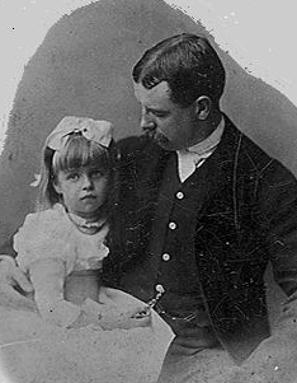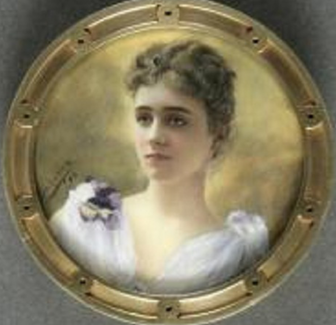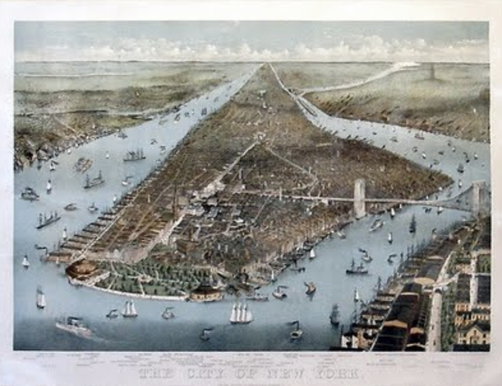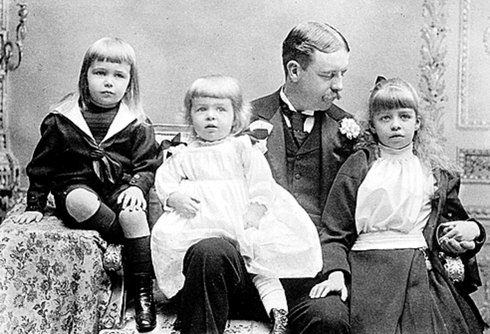Photo Source: Wikipedia Commons
I'm posting here two passages from the book as well as readings of those passages by Donata Peters from the audiobook of Eleanor Roosevelt. In the first passage we look at the world into which Eleanor Roosevelt was born. While researching this section of the book, I rooted through old newspapers and magazines to find first-hand accounts that would give me information on weather, ships, buildings and other features of the world of Anna and Elliott Roosevelt, Eleanor's parents. They were recently married, and Eleanor was born less than a year later.
The World into Which Eleanor Roosevelt was Born:
Source: New York Historical Society
The week of January 6, 1884 brought winter to New York. An ocean steamer came into port from the icy North Atlantic, her sides covered with a frozen waterfall of spray, her ice-coated rigging sparkling with rainbow colors. On the streets omnibus drivers shivered in the open air beneath blankets, overcoats, caps, and mittens. Newsboys poorly clad, some wearing carpets, sacking, or newspapers bundled around their waists for insulation, danced the sailor's hornpipe for warmth while waiting for the wagon with the five o'clock edition.
Anna and Elliott left no written record of their activities during the week of January 6, 1884. But the weather must have drawn them out to enjoy sleigh-riding on colder days, and pressed them closer to the fire in the evenings. They had been married for six weeks and had begun to know one another as lovers. Anna may have been frightened by the strangeness of sex - Victorian women were not expected to enjoy love as unabashedly as their great-granddaughters of a century later. But physical contact must have extended the personal intimacy of previous months, and during the winter of 1884 they conceived their first child.
The days grew longer. Crocuses and sweet-smelling hyacinths pushed through the ground. On Bedloe's Island an army of Italian workmen raised blocks of stone onto a huge pedestal. For eight years there had been stories about a gigantic statue coming to New York from France. Curiosity had turned to skepticism, but now the platform made tangible the promise of a figure representing liberty soon to grace the harbor.
In June the muggy heat of summer enveloped New York. Anna and Elliott attended horse shows and polo matches, visited friends on the Hudson, and vacationed in Newport. In that favored place they sipped tea with the Vanderbilts and dined aboard the Morgan yacht. Anna's pregnancy was beginning to show, and during the summer she and Elliott began to feel the child's movements. As the days shortened and the time for Anna's delivery drew near, the young couple's anticipation was tainted with fear. Children were still delivered at home in the 1880s, and death in childbed was common. Only a few months before, Elliott's sister-in-law, Alice Roosevelt, had died after giving birth to a baby girl.
On October 11 Anna's frame was wracked with pain. Elliott must have waited apprehensively outside the room where his wife, attended by a physician or midwife, struggled with the delivery. Elliott may have heard frenzied movements and a baby's cry. Finally he was told: he was the father of a baby girl, and mother and child were doing well. Relieved, he was allowed to see his daughter, soon to be known as Eleanor. He called her" a miracle from heaven."
The infant Eleanor was probably turned over to a wet nurse, for children of the upper classes were usually not nursed by their own mothers. A few days later she was clothed in a long white christening dress and baptized. Elliott's brother, Teddy, was her godfather.
On the day when Eleanor Roosevelt was born the Civil War was only two decades past, Custer's defeat at the Little Big Horn had occurred only eight years before, and the last Indian Wars had yet to be fought. There were no automobiles and few telephones or electric lights, and New York was a city of five-story buildings lit by gas. A schooner coming into New York would have found a harbor full of sails. Fishing sloops darted across the bay; majestic iron ships under billowing canvas glided on the breezes; and flat side-wheeled ferry boats crowded with horses and carriages paddled back and forth between New York and New Jersey. Manhattan appeared as a wedge of land in the emerald waters of the bay. On the waterfront a latticework of timber, the spars of ships, framed row upon row of warehouses, stores, and office buildings. Flat facades of wood and brick rose to five stories above the water as far as the eye could see.
Hand-Colored Lithograph, Currier & Ives
Donata Peters reads the passage below:
Eleanor was confident of her parents' love. In the mornings she came to her father's dressing room and chattered to him and danced in circles. Then he complained that she made him dizzy and tossed her high in the air. She called herself "father's little golden hair." As Elliott tucked her into bed on the night of her fourth birthday, she told him, "I love everybody, and everybody loves me." Such a cunning, funny little tot, Elliott thought.
On October 1, 1889, when Eleanor was nearly five, Anna gave birth to a second child, Elliott, Jr., who was nicknamed Ellie. Eleanor learned about her new brother while visiting her grandmother at Tivoli. Undeterred by this possible rival, she dictated a letter to her father. What did her brother look like, she asked. Some people said a bunny, others an elephant. She hoped he did not cry, but if he did, she advised, Elliott should have the nurse "give him a tap, tap." She closed, "I love you very much and mother and brother too if he has blue eyes."
If you liked this post on Eleanor Roosevelt, you may also enjoy these other ER posts:
-- Eleanor Roosevelt Tours the South Pacific During World War II
-- Eleanor Roosevelt, Lorena Hickok, a Buick Roadster, and a Trip to Quebec





 RSS Feed
RSS Feed